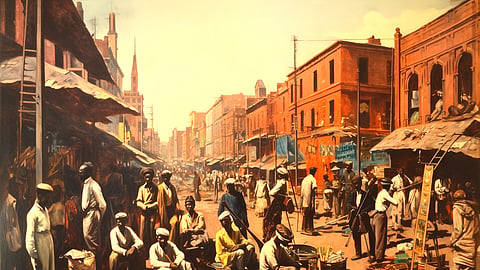- Commentary
- History Vignettes
- Notes on Culture
- Dispatches
- Podcasts
- Indian LanguagesIndian Languages
- Support

DECOLONISATION IS A NATIONAL DUTY and a potential national asset. Duty, to borrow the Bhagavad Gita’s eternal edict, is a profound, lifelong inner calling that has to be pursued for its own sake. An army of ants will flock to its sweet fruit but its bitter fruit is a serpent that bites the doer. As a potential asset, if its value is fully realized, Bharatavarsha will re-emerge as perhaps the only palliative for the global wreckage whose pronounced feature is instability.
Decolonisation is diagnosis, scholarship, process and a civilizational continuum. It is both foolish and impossible to do justice to it even in the space of say, twenty volumes. What I can do at best is to offer some outlines that will hopefully stimulate a deeper and wider study in our own time.
Apart from Sri Dharampal’s inner calling which transmogrified as a generational study of how Bharatavarsha looked before the British colonized her, till date, no comprehensive study of decolonization has been done with the gravity it merits. His work has been ably continued – both in letter and spirit – by stalwarts of our own time such as Sri J.K. Bajaj, M.D. Srinivas et al.
While their findings have been widely published, the impact has been rather minimal because the State apparatus that India inherited in 1947 has remained stubbornly colonial. This embedded colonial nature is the direct cause for how easy it is, even today, to stir separatist sentiments along various fault lines. A thorough decolonisation makes for a united India.
In fact, my own limited studies in this area leads me to the following conclusion: even after three-fourths of a century, Indians have actually become more colonized than they had ever been under British rule. All attempts at decolonization have met with feeble success, and that success has at best been sporadic and short-lived.
True decolonization reflects itself in lasting and culturally-rooted changes in the life and lifestyle of the individual, it will rebuild the family, the community, the society and political and administrative institutions. This was – and still is – the pulsating mantra of everyone working in this arena. However, the power and grip of the negative legacy of colonization, like I said, has proven remarkably enduring.
So, it is better to face the bitter truth bluntly and with confidence if we honestly need to find long-term solutions.
THE FIRST STEP in decolonization involves all-encompassing study and scholarship. This will help us evolve practical and implementable solutions towards comprehensive decolonisation.
Thus, decolonisation is both an academic discipline and a practical process. The discipline should guide the process and the process should enrich the discipline. It is also a mistake to think that decolonization is a specific “goal” to be achieved. It is a continuum.
But at an even more fundamental level, decolonization is the recovery of memory. In our case, it is the recovery of the Hindu civilizational and cultural memory across space and time. When we recover this memory, we automatically recover our narrative memory, as we shall see in more detail.
As an all-encompassing phenomenon, decolonization includes everything from politics to performing your daily Puja at home. In the contemporary, hyperconnected era, this becomes even more stark. At least one generation of the Hindu diaspora has near totally embraced the Woke insanity, which poses one of the most lethal threats to Hindu Dharma.
In one sense, decolonisation is a negative process aimed at achieving a positive outcome. This is akin to rebuilding a destroyed structure. Even if the rebuilding is complete, it still won’t be the original structure. I’ll take a random example to illustrate this: the rebuilding of the Sri Rama Mandir. The new temple is definitely a brilliant civilizational victory, it promises to be truly grand temple but it is not the original temple. I mention this to emphasise the kind of challenges that decolonization involves even in the physical space.
And so, to fully grasp the extent, scale and complexity of this challenge, it is essential to fully understand the obvious phenomenon that led to all this: colonization. We need to answer very basic questions: how do we understand our own Hindu society today? What are the sources and tools that shape this understanding? Is our present Hindu society the same as what it was say, even in 1970? If so, what are the common features? If not, what are the key differences?
History is our indispensable guide for finding answers to these questions. It is crucial for us to understand how, and on what all planes we have been colonized. This mandates us to travel back to about 250 years. We need to study this history and comprehend the kind of the forces that permanently changed India.
Simultaneously, we need to get a clear picture of how the Indian society functioned back then. But our greatest handicap in this endeavour is the fact that we no longer have access to that society. But it is undeniable that the maximum damage occurred at the level of our psyche. This damage was deliberately engineered.
But in the space of this essay series, I can only give a summary of the whole scene.
To be continued
The Dharma Dispatch is now available on Telegram! For original and insightful narratives on Indian Culture and History, subscribe to us on Telegram.
